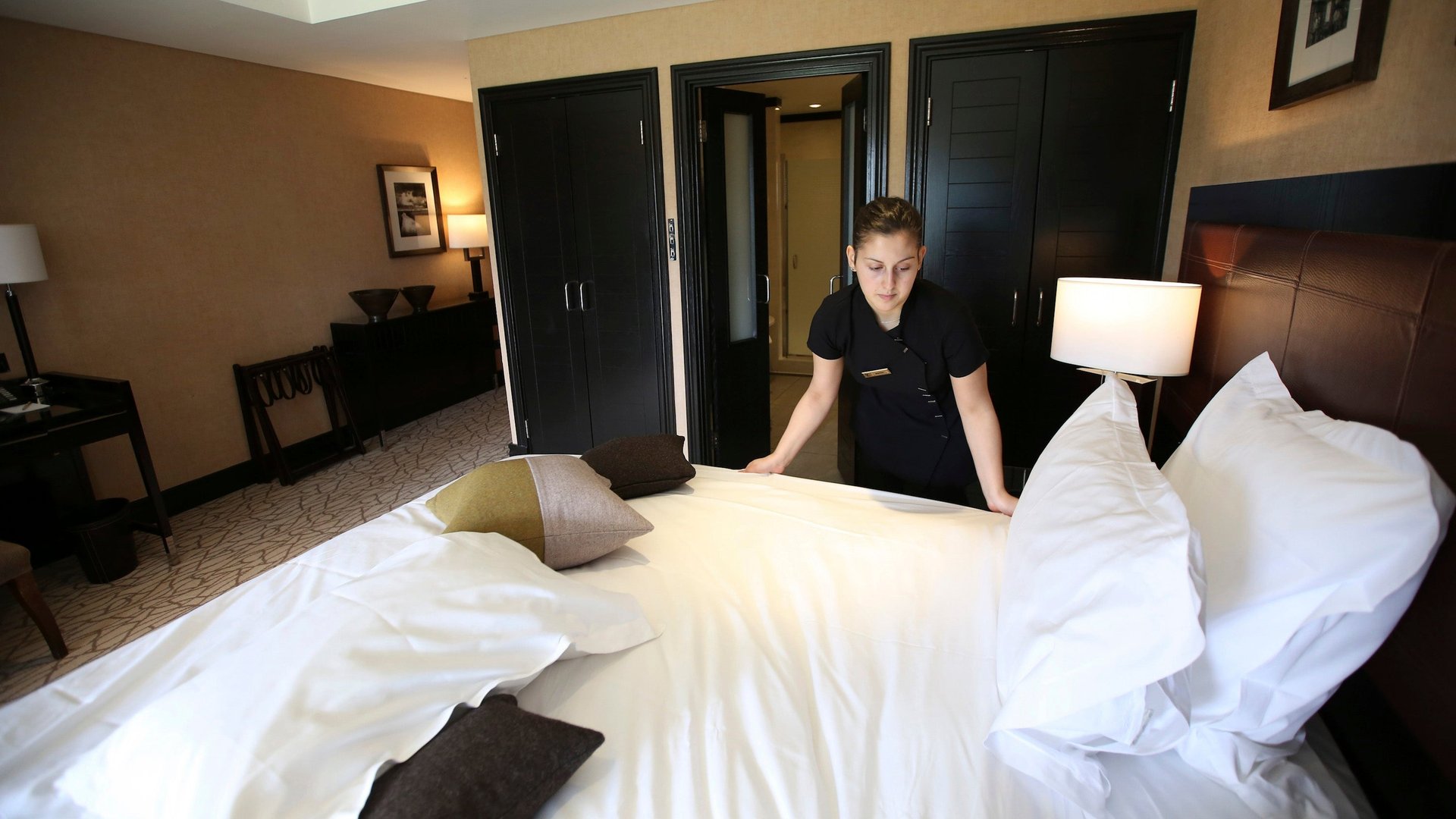Why your hotel maid needs a panic button
When Juana Milan started working at the Westin hotel in Long Beach, California, her supervisor told her to “watch her back.”


When Juana Milan started working at the Westin hotel in Long Beach, California, her supervisor told her to “watch her back.”
For hotel service workers like Milan, it’s a warning that comes with few actionable steps toward safety. Housekeepers around the world often find themselves working alone as they scramble to meet seemingly unattainable room quotas. This leaves them vulnerable to abuse and sexual harassment from clientele.
The problem gained international prominence in 2011, when former International Monetary Fund chief Dominique Strauss-Kahn was accused of sexually assaulting a hotel maid in New York’s Sofitel hotel. Just a few weeks later, police arrested Mahmoud Abdel Salam Omar, the board chairman of an Egyptian salt-production company, alleging that he sexually harassed a room attendant after locking her in his room at the Pierre hotel in Manhattan.
Long Beach’s burgeoning tourism industry, fueled by business travelers (often men traveling solo), offers insights into the risks faced by hospitality workers around the world. Approximately 80% of hotel workers, who are predominantly female, say they’ve experienced harassment or abuse from guests.
Milan began her career as a room attendant nearly three decades ago at a Sheraton hotel not far from her current position at the Westin. She began working there shortly after leaving her native country of El Salvador. Now 50 years old and an American citizen, Milan “never imagined I was going to have so much trouble” at work, she says.
Once, when Milan was working a weekend shift at the Sheraton, a man followed her as she cleaned, peppering her with questions. At one point he left, returning minutes later and entering a guest room with his genitalia exposed. “The first thing that crossed my mind was ‘he is going to hurt you; he is going to rape you,’” Milan said. “As a woman, nothing compares.”
Milan screamed and asked the man to leave, which he finally did. She called downstairs for help, but security “took too long” to arrive and the man was never identified.
“So the problem is not going to be solved,” Milan said. “We have to take care of ourselves.”
In an effort to provide better protection to hotel workers, a coalition of women’s organizations, health professionals, community leaders, and clergy are pushing Long Beach’s city council to adopt new standards. The provisions include a requirement that all workers receive portable panic buttons and that security must respond to calls within three minutes. Guests would be made aware that all workers have these panic buttons, and signage posted throughout the building would attempt to increase awareness of the risks of assault. The hotel would also be legally responsible for keeping precise records of reported assaults.
Alicia Quiros works for the UNITE HERE Local 11, a Southern California affiliate of an international labor organization representing hundreds of thousands of hotel employees and convention catering workers in the United States and Canada. She said codifying these measures could help prompt a broader cultural shift in the hotel industry, helping attendants feel at ease in the workplace and empowering them to speak out if an assault does occur.
“We know there are hundreds of women who have stories that we will never get, because they’re too scared to talk,” Quiros said.
She noted that many workers are immigrant women, contributing to an additional layer of fear for many. Many of them speak limited English and have equally limited alternative job possibilities, making them less likely to come forward.
“One assault is one assault too many,” says Long Beach city councilmember Robert Uranga, who favors instituting the safety and workload measures that workers are calling for. “When you have workers that are in fear of their jobs and in fear of their lives, that is a big part of the working environment.”
The Sheraton hotel in Long Beach declined to comment, and the Westin did not respond to requests for comment.
There is little national precedent for the proposed legal measures in Long Beach, though efforts do exist. In New York City, for example, 90% of hotels give housekeepers and other staff the right to portable panic buttons. That measure passed after the Strauss-Kahn allegations.
Housekeeper Milan said she hopes to keep working in the industry until she retires. But she says she would never want her 29-year-old daughter to work as a housekeeper, for fear that “something would would happen to her, too.”
“Women are scared,” Milan said. “If they make women safe, it will be a better place to work.”